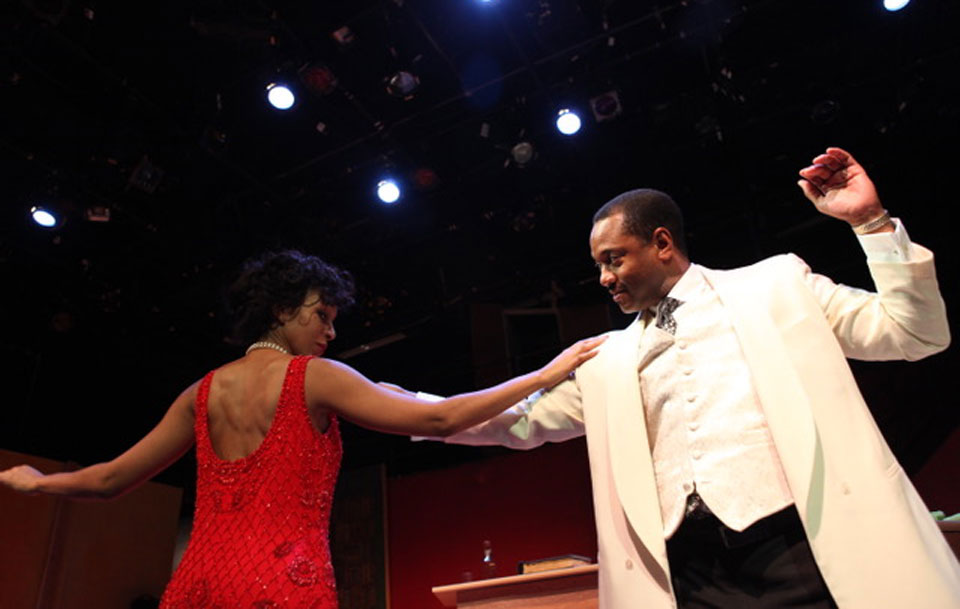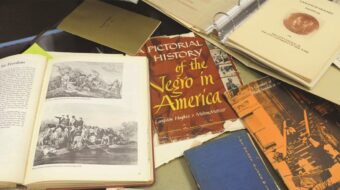
For 26 years, the Robey Theatre Company has made its mission to tell the stories of the Black global diaspora on stage. It is now also doing so in print. The Robey Theatre Company Playwriting Series currently has nine play scripts in publication, available in paperback edition and also in Kindle format. These plays, all by Black playwrights, are available through Amazon (see links below). Critics consider this project a significant publishing event. The Robey takes its name from Paul Robeson.
The plays are:
Birdland Blue by Randy Ross, Ph.D. Birdland Blue, a two-act play, offers a fictionalized riff on a sticky, warm night in the life of legendary musician Miles Davis. It’s summer 1959. The place: Birdland, the famed New York City jazz club. Possessed by the incompatible goals of both creating innovative music and living the life of the rich and famous, Davis comes under great pressure: A nightclub owner doesn’t want to pay him what he’s worth. The police threaten his livelihood. Key members of his great sextet, including Cannonball Adderley and John Coltrane, are rebelling or threatening to quit the band. And a beautiful woman journalist shows up to tilt his balance. Wrestling with his personal demons, will Miles make it through the night unscathed? This play was reviewed in People’s World. https://www.amazon.com/dp/1717917917
Pity the Proud Ones by Kurt Maxey. It is 1915 and America is about to lose its innocence. Martin O’Grady has lost his, and his mulatto son shows no intention of letting it be forgotten. That is, as long as he hasn’t been paid for services rendered to his father. The two men clash when the father is forced to pay his son, by the only woman he ever loved: an ex-prostitute, who is a part owner of the most profitable bordello in St. Augustine, Florida. Promises are made; contracts to be honored. Yet a hurricane makes its deadly approach. Will there be enough time for suffering to be resolved and love to win out over pride? Only time will tell. https://www.amazon.com/dp/1076706843
The Emperor’s Last Performance by Melvin Ishmael Johnson. Charles Gilpin’s performance in Eugene O’Neill’s play The Emperor Jones propelled him to the height of his craft and in one stroke made O’Neill one of America’s greatest playwrights. But the role of Brutus Jones in The Emperor Jones was not Gilpin’s greatest performance. His greatest performance was in pretending that he liked the role that made him a star. The Emperor’s Last Performance traces the life and career of pioneering African-American actor Charles Sidney Gilpin, from his early days in vaudeville, to his rise to fame in Eugene O’Neill’s The Emperor Jones. https://www.amazon.com/dp/1082243108
Sabado Mornings by George Corbin. Set in contemporary Los Angeles, we’re introduced to Eddie—ex-LAPD detective and widower, still struggling with personal pain and shame over his wife’s unnecessary death. Rosa, a Latina Mexican waitress, has remained in a state of suspended animation refusing to realize that her husband, who disappeared while visiting family in Mexico, is not likely to return. The play explores the budding mutual attraction and unveils the evolution of a reluctant love story. https://www.amazon.com/dp/1086440315
92 Grove Street by Randy Ross, Ph.D. Beginning in 1963, a fiery minister, Malcolm X, and a struggling writer, Alex Haley, began meeting late night in a small room to create what would become a touchstone book of the 20th century, The Autobiography of Malcolm X. 92 Grove Street probes what went on in that room close to 60 years ago. https://www.amazon.com/dp/169390201X
The Magnificent Dunbar Hotel by Levy Lee Simon. We want to take you on a journey, a ride, back to a time not too long gone, when the men were so dashing and the women were so fine, if you weren’t careful you might lose your mind. Come with us back to the 1930s and ’40s on Central Avenue in L.A., where jazz was the music of the day. Back to a time when men kept their hair cut and their shoes shined, and you could get a chicken sandwich for a dime. Sunshine and palm trees, cruising on Central Avenue with ease, where the Duke, the Count, Dorothy Dandridge and Lena Horne performed your favorite songs, and intellectuals debated the politics going on, and the average everyday folk felt right at home. Feel that L.A. night breeze, as the jazz music makes you tap your feet and grab your knees. Where was this place you might ask, this place to be, that had all that jazz! Well, do tell, do tell, ring the bell. Come with us back to the Magnificent Dunbar Hotel! It stood high and majestic on Central Avenue, this place to be for the Black community. Entertainers, socialites, athletes, intellectuals, and everyday folk, made The Dunbar Hotel their home before she stood forgotten and all alone. https://www.amazon.com/dp/1086221664

The Wrong Kind of People by George Corbin. Theo, an African-American law student needing privacy to study for the California Bar Exam in 1942 checks in at the exclusive Guardian Hotel located in downtown Los Angeles. He is assigned to “The Colored Room” a rarely used, run-down room at the back of the hotel. During his first night at the Guardian, his studies are interrupted by four diverse “denizens of the night” who seek private entry to the hotel via his window. Over the course of the evening, Theo gains the real-world education needed to prepare him for the challenges of a career as an attorney. See People’s World review. https://www.amazon.com/dp/1675322481

The Reckoning by Kimba Henderson. One plantation, two families, so many secrets. Rubaiyat, a thriving Louisiana crawfish farm owned by the Robillards, an affluent African-American family, was once a sugar plantation worked by slaves, and is consequently filled with ghosts of the past and all manner of secrets and treacheries. As LJ, the family’s fiery but ailing patriarch, prepares to hand over control of the estate to his devoted, yet defiant daughter, Nathalie, her own dashed dreams and long buried family secrets coming to light put Rubaiyat’s future at risk. Then, the resurgence of an age-old betrayal brings the Robillards face to face with the Burnsides, a white family, whose long-held claims to Rubaiyat and bitter desperation to possess it by any means, have made them a dangerous force to be reckoned with. https://www.amazon.com/dp84DGX733
The Daughters of the Kush by George Corbin. When Kathy Greenberg Battle, a young white woman raised in Black culture, decides to pledge the only African-American sorority at the small, midwestern university she attends, it triggers unexpected consequences. The year is 1963, and if Kathy is accepted to become one of the Daughters of the Kush, she would be their first white member. Soon, one of the Daughters responsible for admitting new sisters into Lambda Kappa Nu finds herself succumbing to a volatile mixture of implicit bias, jealousy, and her self-assigned power as the Defender of the Daughters, leading to unexpected moral dilemmas and tragedy. https://www.amazon.com/dp/B08HBHTSDB
With the exception of The Magnificent Dunbar Hotel, all of the plays were developed in whole or in part in The Robey Theatre Company Playwrights Lab. Six of them received their world premieres on the Robey mainstage.
The Robey Theatre Company was founded in 1994 by Danny Glover and Producing Artistic Director Ben Guillory. The Robey Playwrights Lab resident dramaturg is Dylan Southard.
The Robey Theatre Company Playwright Series believes in giving these plays wider exposure, in its words, “Because Black voices matter. Because Black stories matter.” The Robey Theatre Company website is here.

MOST POPULAR TODAY

High Court essentially bans demonstrations, freedom of assembly in Deep South

Zionist organizations leading campaign to stop ceasefire resolutions in D.C. area


U.S. imperialism’s ‘ironclad’ support for Israel increases fascist danger at home

UN warns that Israel is still blocking humanitarian aid to Gaza






Comments